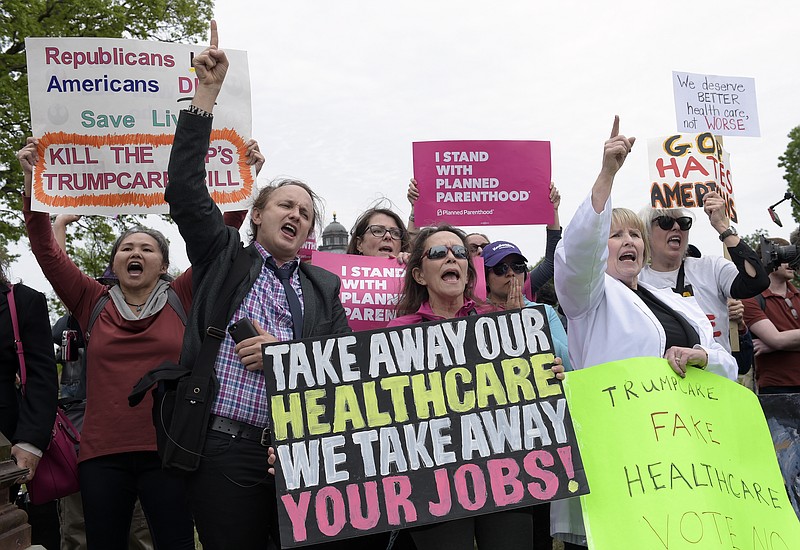A handful of Republicans in the Senate is making a mockery of what normally passes for transparency in our government. A group of 13 senators is drafting a health care reform bill in secret that the Senate is expected to vote on in a couple of weeks.
This is not just any legislation. This is life-or-death legislation that will affect tens of millions of Americans and an industry that makes up one-sixth of the world's largest economy.
Why the secrecy? The Senate bill is being kept under wraps because if there were transparency about the health care plan that the GOP wants to replace the Affordable Care Act with, some might criticize the GOPcare or Trumpcare legislation - aptly and correctly.
"It is deeply disturbing," said Erika Sward, assistant vice president of the American Lung Association, told the Los Angeles Times last week. "Patients groups like ours need to make sure that our patients' needs for health care will be met. ... We can't do that if we can't see what is being proposed."
The lung association is among 120 patient groups that recently sent a letter to senior Republican senators expressing deep concerns about GOP proposals to fundamentally restructure Medicaid, which provides health coverage to more than 70 million poor Americans.
Work on the Senate bill began about six weeks ago, after the House passed its American Health Care Act bill, which was developed as secretively as the Senate's. When House leaders did finally release a finished bill, they voted on it within 24 hours - three weeks before the Congressional Budget Office could estimate its cost and effects.
That CBO score eventually found that the House bill by 2026 will cause 23 million Americans to lose their health insurance and will raise premiums for middle-aged Americans as much as $10,000 a year.
Further, it will reduce the deficit by $119 billion over a decade, primarily with cuts to Medicaid and private insurance subsidies. It also allows private companies to opt out of providing insurance plans for employees. All in order to give the richest Americans a tax cut.
Medicaid, established in 1965, covers more than 1.5 million of Tennessee's 6.6 million residents under a program we know as TennCare. TennCare enrollees are primarily low-income pregnant women, children and individuals who are elderly or have a disability. TennCare pays for 50 percent of the state's births, and covers 50 percent of the state's children. In Georgia, Medicaid - under various names like PeachCare - covers about 1.8 million people.
By 2014, about 80 million individuals were enrolled in Medicaid nationwide, and according to the Kaiser Family Foundation, Medicaid accounted for "$1 out of every $6 spent on health care" in the United States. The GOP plan, under Trump's budget, would slash it by nearly half. What it absolutely will not do it stop people who are poor from getting sick. And when hospitals treat them for "free," someone still has to pay to keep the hospital doors open. If that someone isn't the nation's top taxpayers, who will it be?
The Senate bill will just have to pass by a simple, 51-vote majority. The Senate has 52 Republicans and 48 Democrats.
To rub salt in the wound, the 13 senators drafting this plan are all white men. There are no women or minorities - no diversity.
Even some fellow Republicans are complaining.
Sens. Bob Corker, R-Tenn., Rand Paul, R-Ky., Bill Cassidy R-La., Jerry Moran, R-Kan., and Lisa Murkowski of Alaska have publicly acknowledged that there are real problems with the way in which their party is trying to craft a health care bill.
For all of the complaining and deeply partisan debate over the development of the Affordable Care Act, which ended with Democrats alone voting for the bill, there were Republicans at the table for some of the process, which included 53 hearings and meetings over a period of nearly 15 months.
This legislation, on the other hand, has absolutely no bipartisan oversight or buy-in from major medical stakeholders or patients.
Senate Finance Committee Chairman Orrin Hatch, R-Utah, said holding public hearings about the legislation would only give Democrats more opportunity to attack the bill.
"We have zero cooperation from the Democrats," he said. "So getting it in public gives them a chance to get up and scream."
Sure they have zero cooperation. They're doing it in secret.
"We'll let you see the bill when we finally release it," Senate Majority Leader Mitch McConnell, R-Ky., told reporters last week.
That's just not good enough.
The American people deserve better.
